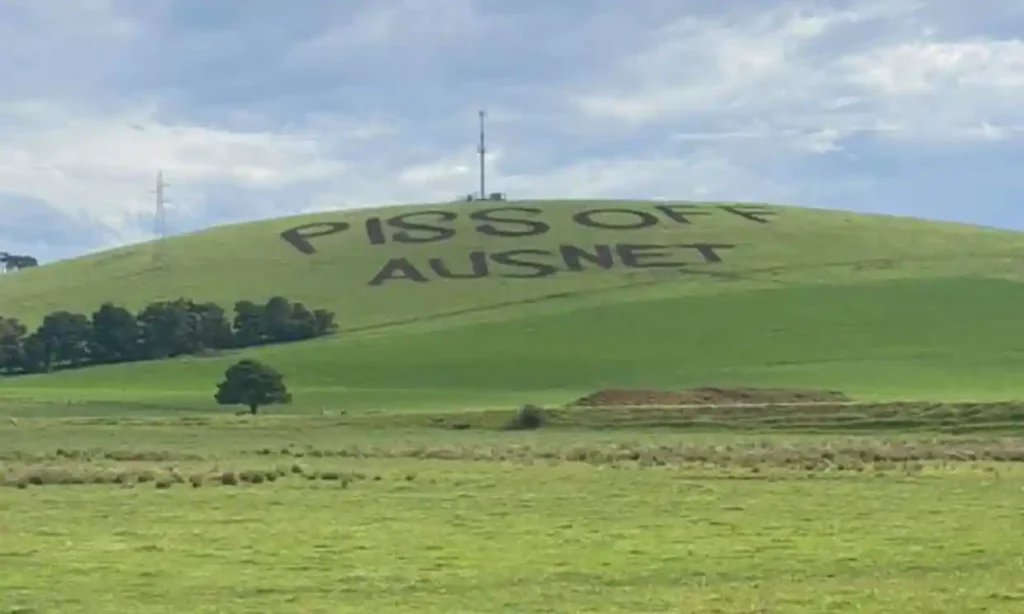from The Guardian

The hill facing the Swiss Mountain Hotel, Blampied, where farmer Anthony Fraser has mowed the message ‘piss off AusNet’ into the hillside for almost two years
A long-running dispute over proposed transmission lines in Victoria’s central highlands is a test case that could have ramifications for the state’s transition to renewable energy.
The words “piss off AusNet” have been mown into a hill at Blampied, near Daylesford, for almost two years. They serve as a billboard for local resentment toward the proposed western renewables link, a transmission line intended to carry wind and solar-powered energy from a power station in Bulgana in western Victoria to Sydenham in Melbourne’s north-west, where it is expected to power the equivalent of 500,000 homes.
The management of the issue, which local candidates say has been fumbled, could have ramifications not just in this weekend’s state election, but also for the Victorian government’s plan to generate 50% of its electricity from renewables by 2030.
The Australian Energy Market Operator (AEMO) awarded the tender for the project to AusNet in 2019, but the company has faced fierce backlash from residents who say the towers will affect their ability to grow potatoes and will negatively affect land value, liveability and tourism.
“We’re still going strong down here, everyone’s against it,” said Anthony Fraser, a potato farmer from Newlyn and the man who owns the ‘piss off’ hill.
“I know they’re trying to meet [renewable energy] targets but it doesn’t make any sense to me to be giving up food to do that, when you could run it elsewhere.
“I really think they need to go back and take another look.”
The proposed route runs through Ripon, the most marginal electorate in the state. Liberal MP Louise Staley held it by just 15 votes in 2018 but a redistribution has made it marginally a Labor seat.
Staley wants to move the project elsewhere.
The current proposed route runs from the Bulgana terminal station down an existing transmission corridor to Waubra terminal station, just north of Ballarat, before cutting across the central highlands to Sydenham in the northwest suburbs of Melbourne. The Liberal party wants to reroute the lines via Mortlake, 122km west of Ballarat, a considerably longer route, but one that would mainly stick to existing transmission corridors.
“It is disappointing that Labor hasn’t recognised the overwhelming opposition to the route it backs,” Staley said.
The Labor candidate for Ripon, Martha Haylett, promised to be a “fierce, loud, and constructive voice in parliament and inside the government to advocate that this project is fixed”. She said consultation on the project to date had been terrible, and has said she will look to put “all options back on the table, including underground”.
Farmers have previously called for the network to run underground along the Western Highway. It is estimated this would cost as much as 16 times more than the above-ground installation.
The Australian Energy Market Operator this month released a report indicating the current route remained its preferred option, and put the total expected capital cost at $737m. An AusNet spokesperson told Guardian Australia the environment effects statement will be lodged in the coming months.
AusNet said the western renewables link was a critical cog in the push to meet the state’s renewable energy targets. It is also seen as a test case of the impact on rural areas of the construction of dozens of new renewable energy projects, many of which will require the construction of new transmission lines to connect them to the grid.
There are 67 large-scale wind and solar projects in operation in Victoria, providing a combined four gigawatts of power. Another 85 projects are under commissioning, under construction or undergoing planning approval, and will provide an additional nine gigawatts of power.
New South Wales last month ruled that those with transmission towers running through their property would receive $200,000 per kilometre of new transmission lines that are built across their properties, to be paid in annual instalments over 10 years, in addition to any compensation they may receive for the acquisition of their land.
Staley said the Coalition would be prepared to look at copying the NSW model if it formed government.
Farmers for Climate Action has recommended Victoria adopt a similar payment scheme.
“Transmission projects which treat farmers fairly and consistently can create drought-proof income for farmers and communities, and can also potentially pay into a local community fund – a huge positive for local communities,” CEO Fiona Davis said.
Dan Cass, an energy policy expert with the Australia Institute, said communities involved in renewable energy implementation should be seen the as beneficiaries of that transition.
But he said taking the lowest-cost option to run above-ground transmission lines, without considering other impacts, was a “rubbish” policy.
“Requiring transmission to be lowest cost, without considering up the broader costs and benefits of the energy transition, devalues the planet and regional communities,” Cass said.
“We can point the finger at a particular project but really, it’s everyone that is involved in the national Integrated System Plan – state governments, the Energy Security Board, transmission companies – everyone should have been upfront and communicating earlier.”
Cass said research conducted by the Australia Institute showed that regional communities were broadly supportive of renewable energy projects.
“If you have the right process from the start, you can really turn it around and make it something that improves these rural areas,” he said. “But it is difficult to unscramble an egg.
“Transmission lines are seen by everyone as ugly, but at the end of the day, climate emergency is uglier.”
